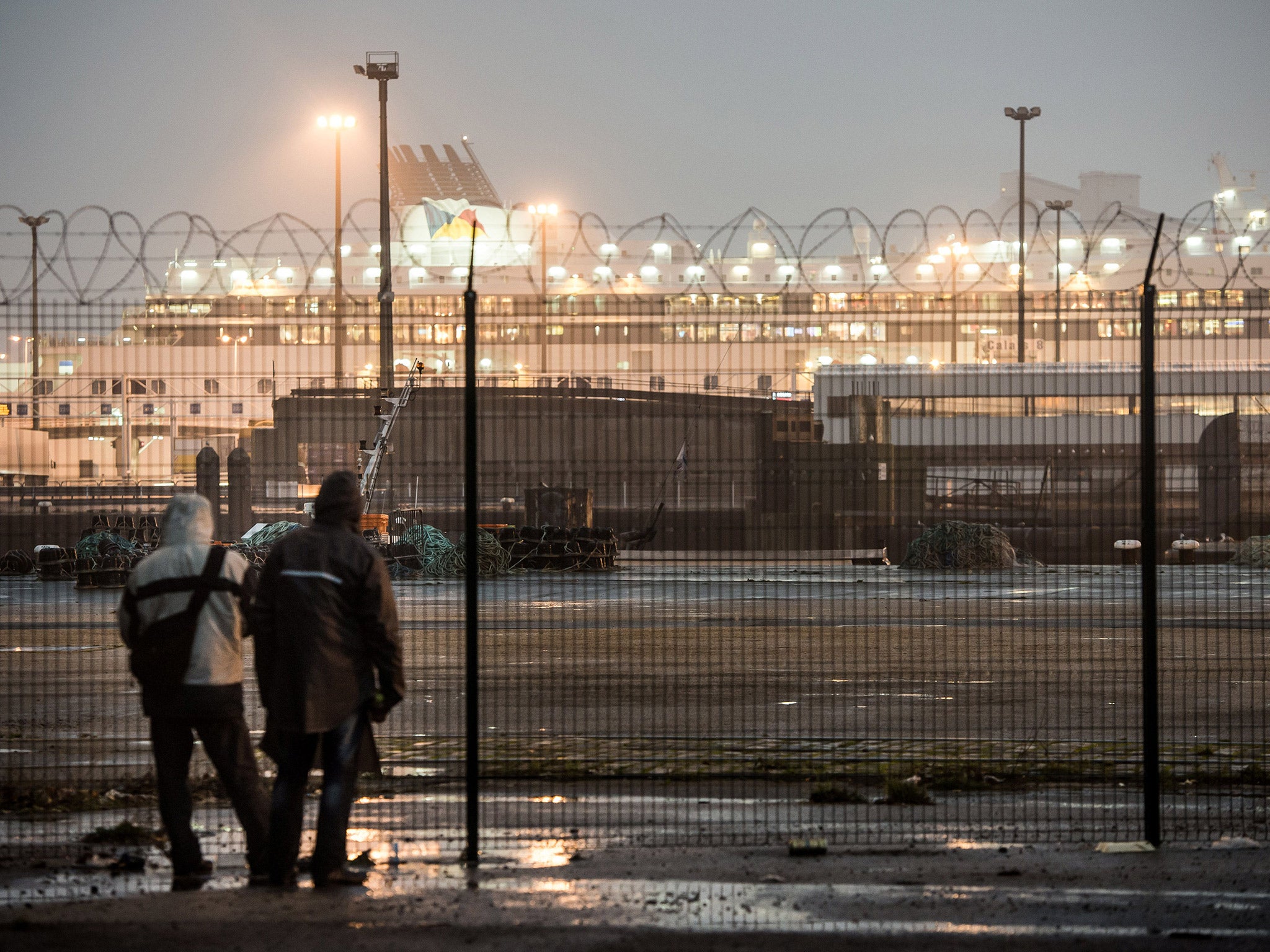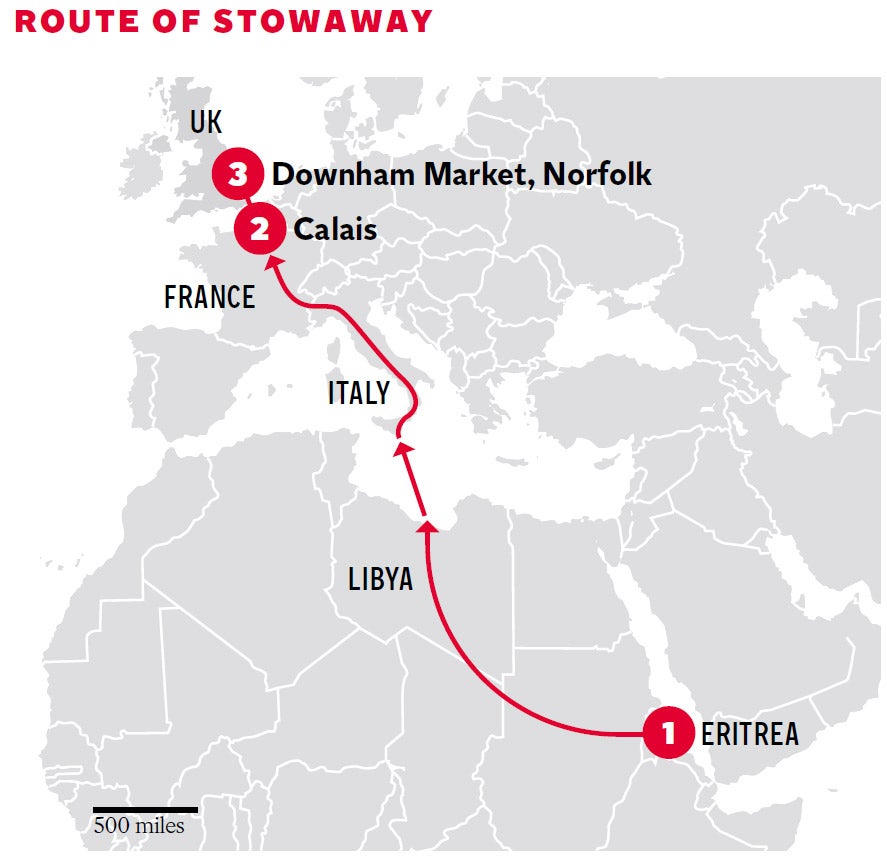Death of an asylum seeker: The tragic story of the Eritrean teenager killed just as he made it into Britain
Ahmed Osman was only 17 when he died under the lorry he rode in on

After two months of living in limbo in Calais and half a day hanging inches from death, Ahmed Osman must have felt that his 3,000-mile journey from Eritrea to join his older brother Jamal on English soil had finally come to a happy end.
At some point on 23 July this year - most probably in the car park of a shopping centre in the French port popular with British holidaymakers wanting to stock up on cheap wine - the 17-year-old slid himself under a gold-painted coach belonging to a Norfolk-based transport company, D&H Harrod Ltd.
For the next 12 hours, the slight teenager clung on in an impossibly narrow cavity between the floor of the coach and its rear axle and drive shaft as it returned to England carrying a contingent of schoolchildren. All that stopped Ahmed from falling into the whirling machinery beneath him was the leather belt from around his trousers which he used to buckle himself to a metal beam on the chassis.

At 1.15am on 24 July, Ahmed began to crawl his way back out of his hiding place, slowly inching through the guts of the coach towards the floor of the D&H Harrod depot on a disused airfield outside the town of Downham Market and, ultimately, a reunion with his sibling.
Among his meagre possessions was the mobile phone which he must have intended to use to make the joyful call declaring that, after a three-month journey traversing the Sahara and the Mediterranean, he had arrived.
It was not to be.
The 90-minute standstill which Ahmed had interpreted as the end of his odyssey was in fact a break while the coach driver, Robert Evans, cleaned the vehicle after its three-day school trip to northern France ready for its next journey later that morning.
Mr Evans then climbed back into this driver’s seat to complete his final task of the night - reversing the coach into position so it could be driven straight from the depot. After checking that his rear view mirrors and a dashboard-mounted camera were clear, he began the manoeuvre.
In a written account of the events of that warm, cloudless night, the coach driver with 38 years’ experience said: “I am very familiar with how my coach feels when it is moving along the road. While reversing on this particular occasion, I felt a slight resistance. It was something that only lasted a brief moment.
“I thought perhaps the brakes had stuck on or perhaps the air was low in the tanks. I remember just looking at the gauges and thinking they seemed OK. It was only when I turned the coach that I saw the body lying in the yard.”
The final horrifying moments of Ahmed’s life were detailed in the clinical surroundings of a coroner’s court in a short hearing on Monday attended by Jamal, who had come to learn what more he could of how a loved brother from his east African homeland came to be lying broken and in a pool of blood on the asphalt of an Second World War RAF bomber base in East Anglia.
The inquest heard that as the Volvo coach was being manoeuvred by Mr Evans, Ahmed most probably fell beneath the double rear wheels, suffering the awful head injuries which killed him instantly. The impact left bruising the pattern of the coach’s tyres on the teenager’s body.
In Calais, where some 2,300 migrants from the world’s war zones are gathered at any one time hoping to smuggle, bribe or even sail their way across the Channel, the deaths of refugees falling from lorries or being struck on motorways has become a grimly regular occurrence.
The Independent has been told of at least 15 fatalities among migrants in the last year, many of them Eritreans and Ethiopians, as they take ever-increasing risks to secure a passage to a new life. The youngest was 16.
Deaths on this side of the Straits of Dover remain rare and, in the case of Ahmed, all the more despairing for the loss of a life so close to the end of a treacherous journey from as Eritrea, where years of war and a vicious authoritarian regime have caused hundreds of thousands to flee.
The United Nations last month reported a tripling to nearly 37,000 in the number of Eritreans entering Europe in the first 10 months of 2014.
Most, like Ahmed, will have paid traffickers some $3,000 (£1,900) for the journey across Africa and the journey, all too often in a leaking boat, across the Mediterranean to Italy, ending in the makeshift camps and squats of Calais from where seek to reach the questionable El Dorado of Britain.
It was a journey which Jamal, 20, made four years ago before successfully arriving in London and being granted asylum. When he received a message that his younger brother was also on his way across the Channel but heard nothing from him, he travelled to France, this time bearing a British passport, to find Ahmed.
The phonecall from Norfolk Police asking him to return home to identify the body of his brother came as he stood in a coach park in Boulogne, one of two places along with the Cité Europe shopping centre in Calais, where Ahmed probably smuggled himself onto the coach.
At Kings Lynn County Court, police investigators said no blame could be attached to the coach driver, Mr Evans.
PC Forbes Scott, a forensic accident investigator, said the void occupied by Ahmed was so narrow he himself could not physically enter it and Mr Evans could not have known of the stowaway’s presence or seen him as he manoeuvred his vehicle. Checks on the vehicle at Calais by British border officials had also failed to find any sign of Ahmed hidden in the bowels of the coach.
Senior Norfolk coroner Jacqueline Lake, who recorded a verdict of accidental death, said what had happened was the “very tragic death of a very young man”.
His brother, a softly spoken man, was too upset to talk after the proceedings but his questions to PC Scott during the hearing told the story of the grief he and his family have endured: “why did Ahmed wait until the last moment to come out?”, “if he had shouted, could he have been heard by the driver?”, and “did he lose his life immediately?”.
The answers, such as the available evidence could show, were “we don’t know”, “no”, and “yes, immediately”.
Jamal left the court building holding a police evidence bag containing the entirety of his brother’s worldly goods - a €50 note, his mobile phone and the buckle from his belt.
An Eritrean friend, who declined to be named, said: “We all come here for the same purpose - to leave behind a terrible war, a terrible place for somewhere safe where we can live with peace and respect. That is all we seek and, as you can see, we will take any risk to achieve it.”
Join our commenting forum
Join thought-provoking conversations, follow other Independent readers and see their replies
0Comments